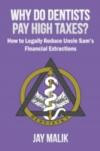 |
|
Why Do Dentists Pay High Taxes?: How to Legally reduce Uncle Sam's Financial Extractions
Jay Malik
Paperback. CreateSpace Independent Publishing Platform 2012-12-19.
ISBN 9781939243010
|
|
|
|
Buy from Amazon.com
|
Publisher description
Why Do Dentists Pay High Taxes? How to Legally Reduce Uncle Sam's Financial Extractions by Jay Malik is written exclusively for dentists so that they can reduce their tax burden legally, while staying within the US tax law and its interpretation by the IRS and the courts. Because tax is one of the main expenses for most dentists, its reduction goes a long way toward providing financial independence for dentists and helping them achieve their goals. The simple and plain language in the book explains the four major tax mistakes made by dentists and their tax professionals that result in their paying tens of thousands of dollars in taxes that are not required. It provides a solution that enables dentists to avoid making these mistakes so that they can benefit from the opportunities already available in the US Tax code. It also explains why these tax loopholes are missed or under-used. Jay's book is free of the usual accountant gobbledygook. Its concepts are explained in an understandable manner because after all, dentists are not financial experts; they are medical practitioners. It refrains from making things more complicated than they need to be. The practical nature of Why Do Dentists Pay High Taxes comes from the author's accomplishments as an expert. He understands the challenges of working with dentists and explains the reasons why they have the problems that they do. Jay's book is unique because it identifies one solution for a multitude of problems. Because dentists are not trained to handle the financial demands of a busy practice, and have neither the time not the expertise to keep abreast of ever-changing tax laws, the book refrains from prescribing self-help solutions. Tax overpayment problems of dentists are simply too complex to be tackled by the dentists themselves. The book's approach is opposite of that which most accountants take, i.e, working after the year has ended with the dentists' books and records to generate tax returns. It proposes first making a comprehensive tax strategy personalized for the dentist's situation and then following it step by step during the year to achieve its ultimate goal of paying less tax legally. Why Do Dentists Pay High Taxes is not meant to be a panacea of one of the biggest afflictions dentists have financially; rather, it is a road map that can be used to identify the goal and move towards a solution. Brevity is a hallmark of this book. The author realizes that dentists do not have time to read a long complicated financial treatise. The professional and family demands on their time are more than that of most other professionals; therefore, the concepts are explained in as many as words as necessary - and no more. Because the author does not intend to charge a high price for the book, he does not feel compelled to fill it with fluff to make it look big. A common trick in the book publishing industry is to add a lot of useless words to fill pages by repeating either the same information or by providing irrelevant anecdotes to make the book look big so its high price can be justified. The book is an essential read for dentists who are just starting their own practice, as it will put them on the right path to prosperity, from the beginning, and save tens of thousands of dollars of their hard-earned money. For those dentists who have been in practice for quite some time, it provides a reality check as far as the management of their finances is concerned. The real value of Why Do Dentists Pay High Taxes is that it provides dentists with an understanding that they have financial options that have not been recommended by their non- specialist accountants or financial advisors. These options are not difficult to follow and are not used by their current advisors merely because they just don't know about them and are too lazy to learn how to implement them. Now, dentists have a resource which they can use to fulfill their financial goals simply by paying less tax - legally
More books by Jay Malik
Similar books
Rate the book
Write a review and share your opinion with others. Try to focus on the content of the book. Read our instructions for further information.
Why Do Dentists Pay High Taxes?: How to Legally reduce Uncle Sam's Financial Extractions
Book reviews » Why Do Dentists Pay High Taxes?: How to Legally reduce Uncle Sam's Financial Extractions
|
|
 |
 |
|
|
|
